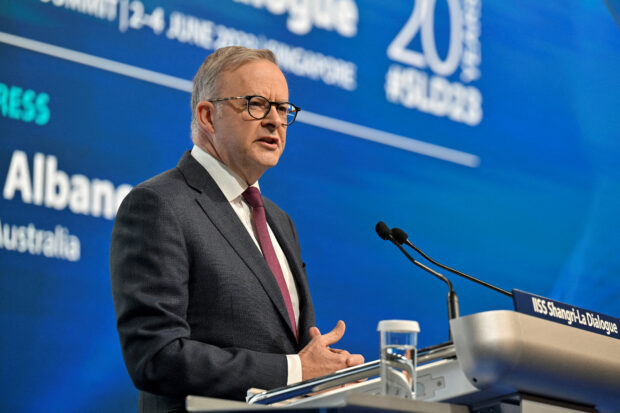Australia PM says Hong Kong bounty on overseas activists ‘unacceptable’

Australia’s Prime Minister Anthony Albanese gives the keynote address for the 20th IISS Shangri-La Dialogue in Singapore June 2, 2023. REUTERS FILE PHOTO
SYDNEY — Australian Prime Minister Anthony Albanese said on Wednesday it was “unacceptable” that Hong Kong has put bounties on two Australian residents who are among eight overseas democracy activists wanted under a national security law.
Hong Kong Chief Executive John Lee said on Tuesday eight overseas-based Hong Kong activists who were issued with arrest warrants for alleged national security offenses would be “pursued for life”.
Hong Kong police have offered rewards of HK$1 million ($127,656) for information leading to the arrest of the eight, including Melbourne lawyer and Australian citizen Kevin Yam, and former Hong Kong lawmaker Ted Hui, who has lived in Australia since 2021.
“It’s just unacceptable,” Albanese said of the Hong Kong announcement in a Nine television interview. “We will continue to cooperate with China where we can, but we will disagree where we must. And we do disagree over human rights issues.”
Australia’s opposition leader Peter Dutton backed Albanese’s comments, telling local media it was “completely unacceptable that Australians should be tracked down or hunted down”.
Article continues after this advertisementThe Hong Kong activists are accused of asking foreign powers to impose sanctions on Hong Kong and China, and are wanted under a national security law that Beijing imposed on the former British colony in 2020.
Article continues after this advertisementAustralian Foreign Minister Penny Wong said Australia is concerned by the broad application of the national security law to arrest or pressure pro-democracy figures and civil society.
Chinese and Hong Kong authorities say the law has restored the stability necessary for preserving the Asian financial centre’s economic success. China’s foreign ministry said countries should “stop providing a safe haven for fugitives”.
In a radio interview on Wednesday, Hui said Australia’s Department of Foreign Affairs and Trade had contacted him to offer protection.
Australia suspended its extradition treaty with Hong Kong in 2020, and a foreign interference law makes it illegal for foreign powers to monitor dissidents or silence community members from exercising freedom of speech.
The other dissidents facing Hong Kong bounties, living in the U.S. and Britain, have had bank accounts frozen, Hui told ABC radio.
“Some of them can be frightened, but they are assured that there is no immediate or imminent threat against them personally. But in terms of travel, in terms of bank account, in terms of financial support they are a bit worried now,” he said.
RELATED STORIES